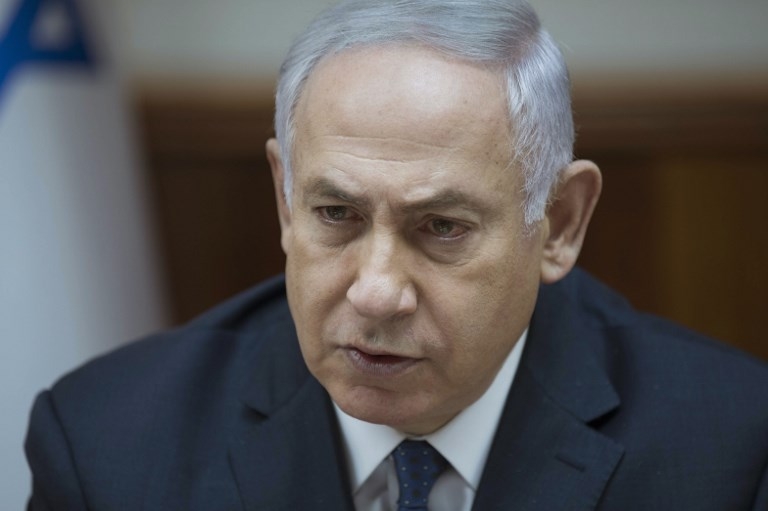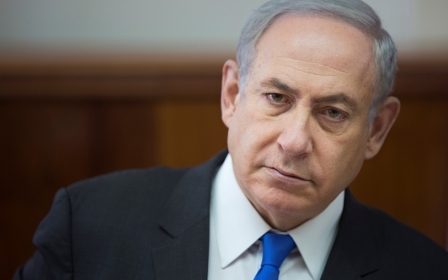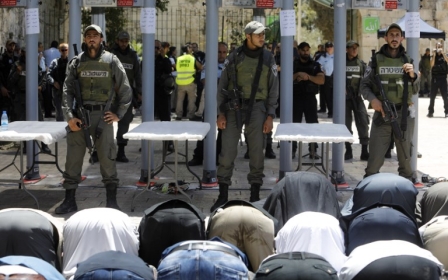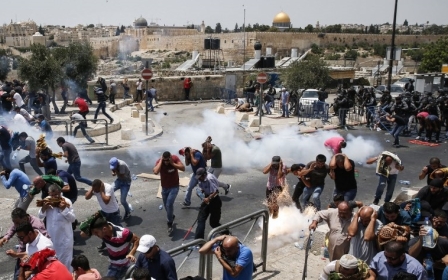Israeli MPs vote to add Jewish settlements to Jerusalem

Israel's parliament on Wednesday passed the first of three votes needed to enact legislation that would shift the demographics of Jerusalem and set an extra-high threshold for any future ceding of parts of the city to the Palestinians.
Israeli Prime Minister Benjamin Netanyahu announced he would back the bill, which aims to expand Jerusalem’s borders to include illegal Jewish settlements in the West Bank and make significant changes to the Basic Law on Jerusalem.
Fifty-one lawmakers from Netanyahu's right-wing coalition, which holds 67 seats, voted for the amendment to the Jerusalem Basic Law - defining the city's legal status - which could pass into law later this year. In all, 41 deputies opposed it.
The two additional votes on the changes could take place after parliament returns from its summer recess in October.
If passed, the bill would bring Ma’aleh Adumim as well as other large and small West Bank Jewish settlements under Jerusalem’s municipal jurisdiction.
The bill’s sponsor, Likud Party MK Yoav Kish, insisted on Wednesday that the bill will not apply Israeli sovereignty to the settlements. Rather, the settlements will be autonomous boroughs of Jerusalem and remain under the military administration that governs the other settlements in occupied Palestinian territory.
The announcement followed Israeli Education Minister Naftali Bennett and Jerusalem Affairs and Heritage Minister Zeev Elkin’s introduction on Tuesday of Knesset legislation.
Demographic shift
Should it go through, the bill is also expected to reduce the number of the city's Arab residents.
The bill, which is partly aimed at bolstering Jerusalem’s Jewish majority, would split off some of Jerusalem’s Arab neighbourhoods – the Shoafat refugee camp, Kafr Aqab and Anata - turning them into autonomous boroughs under Israeli jurisdiction.
Although still part of Jerusalem, the Shoafat refugee camp and Kafr Aqab were cut off from the rest of the city when the West Bank security fence was built.
If the government exercises the option of making the changes in the municipal boundaries, the two locations would be outside of Jerusalem's municipal boundaries but remain under Israeli sovereignty.
Jewish Home's Knesset faction chairwoman, Shuli Moalem-Refaeli, who sponsored the bill in the Knesset, told Haaretz: “This makes it possible to make municipal changes in the territory of the city on the condition that the [new] municipal authority will also be under Israeli sovereignty."
In a legal opinion for the committee, the legal advisor to the Knesset's constitution, law and justice committee, Gur Bligh, wrote that the amendment is intended to determine that no constitutional impediments exist to making changes in the municipal boundaries of Jerusalem.
The bill passed its preliminary reading in the Knesset last week.
Palestinian neighbourhoods
The main difference between the Shoafat refugee camp and Kafr Aqab on one hand and other Palestinian neighbourhoods of the city on the other is that the two locations are on the West Bank side of the security barrier.
According to a study conducted by Jerusalem's Gihon municipal water company, there are a total of 140,000 residents in the two neighbourhoods, some of whom do not possess blue Israeli identity cards indicating that they are permanent residents of the city.
Because of the presence of the security barrier, municipal authorities and Israeli police rarely provide services to the residents of the neighbourhoods and in recent years, conditions there have deteriorated considerably.
Splitting off Palestinian neighbourhoods of the city is a matter of major concern among Palestinians in Jerusalem when it comes to their future status and over whether conditions in their areas would become even worse.
New MEE newsletter: Jerusalem Dispatch
Sign up to get the latest insights and analysis on Israel-Palestine, alongside Turkey Unpacked and other MEE newsletters
Middle East Eye delivers independent and unrivalled coverage and analysis of the Middle East, North Africa and beyond. To learn more about republishing this content and the associated fees, please fill out this form. More about MEE can be found here.




